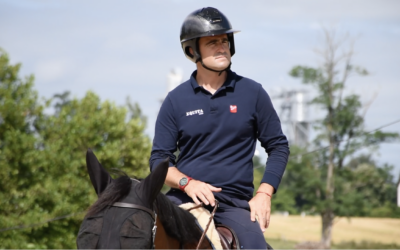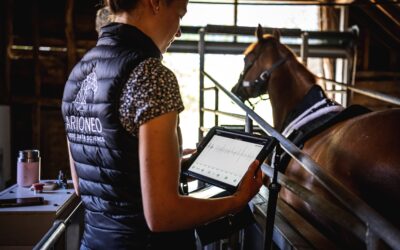EXPLORE
OUR BLOG
Here you will find information about performance and health measurements as well as tips about athlete horse health monitoring, telemedicine cases and equine well-being.

Subscribe to our newsletter
LATEST ARTICLES
ALL ARTICLES
Olivier Perreau, bronze medallist in team show jumping: prevention, a key to high-level competition with EQUISYM
We had the chance to interview professional show-jumper Olivier Perreau about his use of EQUISYM. Discover how new technologies can be perfectly integrated into the practice of high-level horse riding.
Giordana Girini, integrating the Advanced program into her vision of a future data analyst
Giordana, an equine science and osteopathy enthusiast, tells us about her journey, her experience with the Advanced Program, and how she integrates data into her daily life.
The silver medallists share their preparation with EQUIMETRE Vet
Find out how EQUIMETRE helped French eventers prepare for the big event ahead.
How Jarrad Cook, data analyst at Kris Lees Racing improved his data knowledge with the Advanced program
Jarrad Cook, data analyst at Kris Lees Racing in Australia, shares his experience of the Advanced program and how he uses the Equimetre in his daily work.
Laura Fitzharris: how does the Advanced program integrate her veterinary practice?
Laura tells us how the Advanced program has enriched her veterinary practice and enabled her to integrate data into the monitoring of athlete horses.
Combining well-being and high performance: how Equisym brings serenity to Pauline Basquin’s work with her horses?
We were lucky enough to interview the professional dressage rider Pauline Basquin about her use of EQUISYM. Find out how new technologies can be perfectly integrated into high-level equestrian practice.
4 reasons to use Equisym during a pre-purchase examination
By using advanced motion sensor technologies such as EQUISYM, the veterinarian is able to take an objective and precise approach to assessing the horse’s physical condition and locomotion, providing essential information to guide purchasing decisions.
Kevin Staut and Marie Madeuf’s experience with EQUISYM
We were lucky enough to interview the professional jumping rider Kevin Staut about his use of EQUISYM. Find out from Dr. Marie Madeuf and Kevin Staut how new technologies can be perfectly integrated into high-level equestrian practice.
Heart murmurs in horse athletes
The cardiovascular system can be compared to a huge orchestra, and the presence of any structural defect can alter the functioning of the system and throw the orchestra out of harmony. A heart murmur is added to the initially audible heartbeat and becomes a false note in the orchestra, requiring the trainer to intervene on several levels.
.









